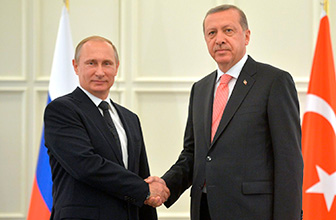
Armenia’s Reformers Struggle On  By Armen Grigoryan, Vice-president, Yerevan-based Centre for Policy Studies
By Armen Grigoryan, Vice-president, Yerevan-based Centre for Policy Studies
After last year’s war, hopes that the 2018 revolution will fulfil its promise are fading – but it’s not too late for change.
“A stellar performance in one year is no guarantee of future success,” declared The Economist after Armenia held free and fair elections three years ago. The qualified praise was not without cause. It was always likely that Armenia’s attempts at democratic consolidation would be difficult, particularly because of the need for some unpopular reforms. Prior to the December 2018 parliamentary elections, observers noted that civic demobilisation – the influx of non-profit sector professionals to the government and their ensuing unwillingness to criticise it – could potentially undermine political pluralism, enable re-emergent authoritarianism, or foster the rise of right-wing populism. READ MORE
- EGF Editor |
Published on EGF: 05.05.2021
| External Relations
-
Russia’s Peace Mission in Karabakh Provokes Reaction in Azerbaijan  By Fuad Shahbazov, Baku-based independent regional security and defence analyst
By Fuad Shahbazov, Baku-based independent regional security and defence analyst
As part of the 10 November ceasefire agreement that ended last year's 44-day war, a contingent of Russian soldiers was deployed to Karabakh as peacekeepers. However, the lack of a formally agreed mandate and perceptions of Russian overstepping has led to growing tensions between Baku and Moscow.
The second Karabakh war ended with the signing of a Russia-brokered ceasefire agreement and the deployment of Russian peacekeeping forces with the aim of preventing further hostilities and ensuring stability in the region. However, the ceasefire arrangements between Azerbaijan–Armenia on one side and Russia–Turkey on the other has left more questions than answers. The fact that there is still no formally agreed mandate for the Russian forces operating on the ground causes outrage in Azerbaijan as local authorities loudly criticise Moscow for provocative actions. READ MORE
- EGF Editor |
Published on EGF: 05.05.2021
| Security
-
The EU Will Not Act as a Counterweight to Russia in Either Armenia or NKR  By Benyamin Poghosyan, PhD, Chairman, Center for Political and Economic Strategic Studies
By Benyamin Poghosyan, PhD, Chairman, Center for Political and Economic Strategic Studies
The EU is neither willing nor capable of countering Russia or Turkey in Armenia and Azerbaijan and will not make efforts to decrease Russian influence in Armenia and the unrecognised Nagorno Karabakh Republic.
EU-Armenia relations entered a new phase in 2009 when the EU launched its Eastern Partnership Initiative. Armenia successfully negotiated an Association Agreement with the EU and was going to sign it in autumn 2013. The growing tensions between Russia and the West forced Armenia to cancel the signature, not to ruin relations with its strategic ally. Armenia and the EU started a new round of negotiations in late 2014, culminating with the signature of the Comprehensive and Enhanced Partnership Agreement (CEPA) in November 2017. READ MORE
- EGF Editor |
Published on EGF: 05.05.2021
| External Relations
-
The Realistic Policy of Armenia towards Nagorno-Karabakh  By Benyamin Poghosyan, PhD, Chairman, Center for Political and Economic Strategic Studies
By Benyamin Poghosyan, PhD, Chairman, Center for Political and Economic Strategic Studies
The 2020 Karabakh war has dramatically changed the geopolitical status quo in the South Caucasus. Discussions have been underway in Armenia and the Armenian Diaspora about the reasons for the catastrophe and those responsible. Most probably, military defeat will be a key topic during the upcoming June 2021 snap parliamentary elections. The thorough analyses of what happened before, during, and after the war are mandatory tasks to be fulfilled. However, the key for Armenia now to elaborate a new policy towards the Karabakh conflict, taking into account the war results. The most significant issue here is to develop a realistic policy based on accurate calculations, Armenia’s resources, and the interests of external players; otherwise, Armenia may face another catastrophe. READ MORE
- EGF Editor |
Published on EGF: 28.04.2021
| External Relations
-
Beijing’s Long Road to the Gulf Region  By Fuad Shahbazov, Baku-based independent regional security and defence analyst
By Fuad Shahbazov, Baku-based independent regional security and defence analyst
Energy cooperation has been a key aspect of growing bilateral cooperation between China and the Arab states of the Gulf region for the past several years. Since 1996, China has become a net importer of crude oil and, as the second‑largest energy consumer in the world after the United States, is now the third‑largest importer of oil after the United States and Japan. Therefore, it should not come as a surprise that China is eying a deep and strategic partnership with the states of a region that sits on top of the world’s largest proven crude oil and natural gas reserves. READ MORE
- EGF Editor |
Published on EGF: 17.04.2021
| External Relations
-
Russian-Turkish Relations: Moscow Calls the Tune  By Eugene Kogan, Tbilisi-based defence and security expert
By Eugene Kogan, Tbilisi-based defence and security expert
The relationship between Russia and Turkey is an unequal one. Turkish President Recep Tayyip Erdoğan does not like playing second fiddle in the Russian-Turkish orchestra, conducted by Russian President Vladimir Putin. However, at every twist and turn, Putin holds more leverage over Erdogan than the other way around.
Putin will cooperate with Turkey as long as it suits Russian interests. He would quickly end the relationship if Turkey were to turn against him and tried to return to the Western fold from which it has drifted away ever since the failed coup on 15 July 2016. Erdoğan is aware of this and, as a result, is leading Turkey ever deeper into the Russian fold since the European Union, the United States and NATO all remain suspicious of him and his administration’s goals and are simply unwilling to assist him in his various military activities in Libya, Syria and, most recently, in the South Caucasus. READ MORE.
- EGF Editor |
Published on EGF: 17.04.2021
| External Relations
-
Russian Goals in the Armenian Snap Parliamentary Elections  By Benyamin Poghosyan, PhD, Chairman, Center for Political and Economic Strategic Studies
By Benyamin Poghosyan, PhD, Chairman, Center for Political and Economic Strategic Studies
Armenia is actively preparing for the 20 June 2021 snap parliamentary elections. Political parties are making their final calculations regarding the format of their participation. The main battle will probably occur between the incumbent prime minister, Nikol Pashinyan, and the second president of Armenia, Robert Kocharyan. The latter has already confirmed that he will lead an alliance of two or three parties. The Armenian Revolutionary Federation, the “Motherland” party, established by the former director of the National Security Service, Artur Vanetsyan, and the new “Rebirth Armenia” party established by the former governor of the Syunik region, Vahe Hakobyan, which unites several mayors from the Syunik, may create an electoral bloc under the leadership of Robert Kocharyan. READ MORE
- EGF Editor |
Published on EGF: 14.04.2021
| External Relations
-
The Karabakh War: The Lessons of Defeat in the Cyberspace  By Lieutenant-General (Ret.) Hayk S. Kotanjian, PhD, Professor Strategic Security Studies
By Lieutenant-General (Ret.) Hayk S. Kotanjian, PhD, Professor Strategic Security Studies
Reflecting on the lessons of the military aggression of Turkey and Azerbaijan against the Nagorno-Karabakh Republic and the Republic of Armenia, strategic analysts of the security institutions and processes continue to monitor the dynamics of the peace-war around Karabakh in the context of the world order transformation. Russian President Vladimir Putin at the session of the Russian Security Council of March 26, 2021, emphasizing the exceptional role of cybersecurity, pointed out the strategic priority of the development of the cyberspace resources management system. In general, this coincides with the assessments of the special significance of this security sector, voiced recently by the US President Joe Biden and Chinese President Xi Jinping. READ MORE
- EGF Editor |
Published on EGF: 07.04.2021
| Security
-
A Vote Largely Motivated by Hate in Armenia’s June ‘21 Elections  By Benyamin Poghosyan, PhD, Chairman, Center for Political and Economic Strategic Studies
By Benyamin Poghosyan, PhD, Chairman, Center for Political and Economic Strategic Studies
Former president Robert Kocharyan has emerged as the strongest challenger to prime minister Nikol Pashinyan in Armenian’s forthcoming parliamentary elections. However, most voters are simply motivated by their hate of one or the other.
Armenia is looking forward to the snap parliamentary elections scheduled for June 20, 2021. According to the preliminary agreement between the ruling "My step" faction and the two parliamentary opposition parties, prime minister Nikol Pashinyan will resign at the end of April, beginning of May; Parliament will not elect a new prime minister twice; and will thereafter be automatically dissolved as provided for by the Armenian constitution. READ MORE
- EGF Editor |
Published on EGF: 07.04.2021
| External Relations
-
Are We Seeing a New National Strategy on Human Rights Emerging in Uzbekistan under President Mirziyoyev?  Embassy of the Republic of Uzbekistan in the Kingdom of Belgium
Embassy of the Republic of Uzbekistan in the Kingdom of Belgium
On June 22, 2020, the President of the Republic of Uzbekistan, Shavkat Mirziyoyev, signed a Decree on Approval of the National Strategy of the Republic of Uzbekistan on Human Rights. Much has been said about Uzbekistan’s efforts to reform and modernize multiple aspects of society and economy since Mirziyoyev became president in 2016. Human rights are a core area of national reform, in this respect. It should be noted from the outset that discussions around this subject in Uzbekistan during the early years of the country’s independence have not always focused on the most celebrated factors.
READ MORE
- EGF Editor |
Published on EGF: 07.04.2021
| Security
-
